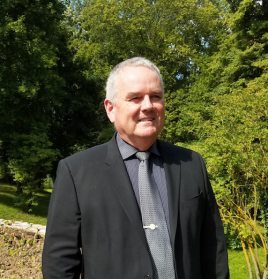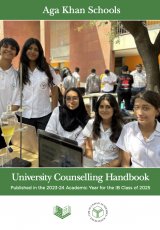Jonathon Marsh: Supporting the quality of teaching at the Academies
Jonathon Marsh has system-wide responsibility for teacher development at the Aga Khan Academies network. Having worked for the Academies for the past 10 years, he has previously had leadership roles in education in Canada, Hong Kong, the United Arab Emirates and the United Kingdom, including as the Head of Professional Development and Research for the International Baccalaureate. In this interview, he shares the highlights of his position at the Academies, and reflects on how the Academies are unique from other educational institutions.
Tell us the journey that led you to the Academies.
I first came across the AKDN when I was in Hong Kong. I read a recruitment ad in the Times Higher Education magazine seeking people to fill positions at the then recently opened Aga Khan University in Karachi. I remember looking at the ad and experiencing a strong sense of conviction that one day I would work for this organisation. More than a decade later, while working at the IB, I was introduced to Salim Bhatia [Director of Academies] by the then Chair of the IB’s governing council. Salim asked me if I knew anyone that would be interested in taking a lead role in teacher development for the emerging Academies. At the same time, he was in discussion with Monique Conn, who was my line manager at the IB, about the position of Academic Director. Monique accepted the position soon thereafter and persuaded me to join as well.
What is the most rewarding aspect of working for the Aga Khan Academies?
I think the majority of my colleagues would unanimously reply “the students”, and they would be right to do so. However, for me the job is about quality teaching, and having the opportunity to really influence the discourse on teaching and learning in the countries and regions we work within is very exciting. Having a chance to work both at the high end with government ministries, NGOs and universities and at the chalk face with individual teachers, especially young people new to teaching, provides me with a full spectrum of very meaningful and satisfying engagements.
What led you to choose your particular career?
I don’t see it as a career but rather as a vocation. I see the profession of teaching as critically important to the health and ongoing development of any society. As such, I can think of no better way to contribute to the betterment of humanity.
What attracted you to the Academy?
First and foremost, the vision and mission. Especially attractive is His Highness the Aga Khan’s insight into the importance of the profession of teaching and the need to restore its much diminished status in the various geographies within which the Academies are located.
Reflecting on your time at the Academy, is there a particular day that was especially rewarding and memorable?
There are too many to count. Among them perhaps two stand out: 1) the graduation of the first cohort of teacher interns completing the Teacher Preparation Programme (TPP), and 2) becoming the first (and as yet only) school network in the world to offer a teacher development programme recognised under the IB Educator Certificate initiative. The building of the TPP and overcoming the many associated challenges took an extraordinary amount of effort, with contributions coming from many people. Seeing it come to fruition was very gratifying.
How do you think you contribute to the inner workings of the Academies and to the achievement of its goals?
I work collegially with the Heads and senior staff in each Academy to think through and implement systems to support the quality of teaching across the network. This includes working with both external and internal providers to source and implement professional development programmes; liaising with universities and other AKDN agencies to define and conduct research and development projects; providing support for the collection and analysis of standardised data; ongoing development and application of the Academies’ teacher appraisal programme; specifying career pathways for teachers; and contributing to the specification of the Academies outreach strategy.
What sort of positive impact have the Academies had on you?
I have gained a great deal of knowledge and understanding around what it takes to start up a high quality school. I have also gained a great deal of insight into the full complexity of running a school. I have always had a great deal of admiration for those brave and committed enough to teach, but my admiration has grown considerably for those who continue to do so under very difficult circumstances.
In what ways has the Academy helped you to become a more effective advocate in the education world?
I am nearing the end of my professional life (I am not really sure what that means other than a euphemism for being over 60), and my role in the Academies has provided me with a unique opportunity to apply much of the knowledge and understanding I have gained over the years. I have drawn upon my background in philosophy and spirituality to better ground my efforts to develop systems within His Highness’s vision for the Academies. I have drawn upon my studies in educational technology to inform system development. My time at the IB has helped me to understand the particular needs of IB teachers and how to support them. The years spent in tertiary education have enabled me to better liaise with universities and support research and data collection. Working with the Academies has allowed me to not only to promote principles of good practice and high quality education, it has provided me with a platform to do so in places that are hungry for change and very much in need of educational reform.
How would you describe the teacher development work with which you engage?
I would describe it as very rewarding precisely because it is very challenging. When it comes to teacher development, we are dealing with many layers of readiness among practitioners. Each country has its own approach to teacher preparation, and within each country not all teachers are given equal standing. For example, senior school teachers are typically better trained and better paid than junior school teachers. Junior school teacher preparation often does not involve gaining a university degree, and only those who could not get into a university opt for junior school teacher training programmes. Convincing people that teaching young children is at least as complex and difficult as teaching older kids is surprisingly difficult. Yet how are we supposed to achieve the kinds of sophisticated learning outcomes envisioned by His Highness if we do not prepare students for them right from the beginning? Building the necessary culture of professional respect for the expertise of all teachers, and indeed helping teachers to define and value their own professional identities is particularly important and very challenging.
What do you think sets the Academies apart from other educational institutions?
The Academies are not unique. There are other schools around the world which share many of the same attributes. However, they do have some very interesting defining characteristics. Firstly, the degree to which they are vision and mission led is compelling for many. Secondly, the commitment they have to provide access to excellent education to talented kids regardless of their ability to pay. Thirdly, their commitment to serve the countries they are in by providing an international standard of education for a majority of local students and employing 80% local teachers. Lastly, their rootedness in the local community and their ability to draw upon the many strengths of the wider AKDN as well as the committed and generous support of the Ismaili community.
How do you think the Academies ensure a climate of pluralism?
The Academies strive to value each child and each member of staff as a unique individual, and expect each to make a unique contribution. A pluralistic perspective is promoted by bringing together individuals from across cultural boundaries, tribal lines, disparate geographic locations, genders, ages, faiths, and economic backgrounds and providing them with a continuous and intensive opportunity to engage with, understand, and come to value each other’s “otherness”.





